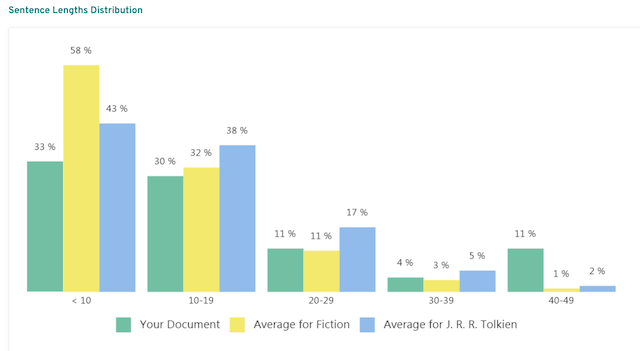
We all have our writing heroes. C.S. Lewis, Stephen King, Margaret Atwood - the writers we read all help shape us.
But how much have they shaped your writing?
ProWritingAid's Summary report, has loads of great features, from helping you set and monitor your writing goals to new and improved graphics and visualisations to help you get to know your writing better.
Today we're looking at Author Comparisons.
What Are Author Comparisons?
ProWritingAid's author comparisons feature allows you to select your favorite author and compare their writing to yours in the following areas:
- Emotional Tells
- Bad adverbs
- Sentence Length Variety
- Sentence Structure
- -ing Starts
- Dialogue Tags
- Dialogue Tags with Adverbs
You'll be able to see how your writing compares in these areas to the average for your chosen genre and your favorite author.

Setting Up Author Comparisons on ProWritingAid
You can set your chosen author by going to your settings page.

Scroll down to the bottom, and then use the dropdown menu to select from a list of over 90 authors.
ProWritingAid has stats for each author based on their published works. These will appear alongside the stats for your writing when you click on the Summary Report.
How To Use ProWritingAid's Author Comparison
To see how your writing shapes up compared to your chosen author, you'll need to generate a Summary Report.

You can then see how your writing compares through graphs and visualisations.
How Comparing Your Writing Makes You a Better Writer
Most of the time, the age old advice to 'never compare yourself to others' rings true. The same goes for writing - your novel is your own. It's unique, and you don't want it to sound the same as everyone else's.
So why compare?
Let's say you're writing fantasy. Chances are you have a solid grasp of the conventions of the genre. You've read all the big works, you've done your research. You might have all of the elements of a good fantasy novel in your manuscript, but your writing still feels... off.
Sometimes these problems aren't with the overall arc of your story, but at sentence level. Comparing your writing to an author in your genre helps you experiment with different areas of your writing until it feels right. After all, who better to learn from than the masters?

We're not saying you need to match Tolkien's sentence lengths to write a good fantasy novel, or have the same proportion of unusual dialogue tags as John Grisham to write a great thriller. But having an idea of the techniques these authors use can help you move your writing in the right direction.
Final Thoughts
Your writing is your own - but that doesn't mean you can't take inspiration from the greats. Find out how your writing shapes up with a free ProWritingAid account:

